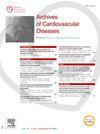通过儿科病例调查发现家族性扩张型心肌病的异常遗传变异
IF 2.2
3区 医学
Q2 CARDIAC & CARDIOVASCULAR SYSTEMS
引用次数: 0
摘要
扩张型心肌病(DCM)是一种罕见但严重的儿童心衰原因。在特发性病例中,尤其是家族性病例,通常涉及遗传病因。方法我们报告一例2岁男童因全身性水肿和心力衰竭而入院。超声心动图显示DCM伴有左室射血分数明显降低。他的姑姑曾在成年期被诊断为DCM。进行完整的病因评估,包括全外显子组测序(WES)。结果发现TTN基因的杂合致病变异(OMIM 188840)与常染色体显性分离的家族性DCM (OMIM 604145)和家族性肥厚性心肌病9 (OMIM 613765)相关。此外,在CTNNA3基因中发现了一种杂合的可能致病变异,与常染色体显性心律失常性右心室发育不良13型(OMIM 615616)相关。这两种变异都很罕见,在文献中几乎没有报道。这些发现支持基因诊断,并导致扩大家庭筛查和早期临床监测。结论:该病例强调了全外显子组测序在儿童DCM中的价值,能够识别罕见的遗传变异,对诊断、预后和家庭管理具有重要意义。本文章由计算机程序翻译,如有差异,请以英文原文为准。
Unusual Genetic Variant in Familial Dilated Cardiomyopathy Identified Through Pediatric Case Investigation
Introduction
Dilated cardiomyopathy (DCM) is a rare but serious cause of heart failure in children. In idiopathic cases, especially when familial, a genetic etiology is often implicated.
Method
We report the case of a 2-year-old boy admitted for generalized edema and signs of heart failure. Echocardiography revealed DCM with markedly reduced left ventricular ejection fraction. His paternal aunt had been previously diagnosed with DCM in adulthood. A full etiological assessment, including whole exome sequencing (WES), was performed.
Results
WES identified a heterozygous pathogenic variant in the TTN gene (OMIM 188840), associated with autosomal dominant isolated familial DCM (OMIM 604145) and familial hypertrophic cardiomyopathy 9 (OMIM 613765). Additionally, a heterozygous likely pathogenic variant was found in the CTNNA3 gene, associated with autosomal dominant arrhythmogenic right ventricular dysplasia type 13 (OMIM 615616). Both variants are rare and scarcely reported in the literature. These findings supported a genetic diagnosis and led to extended family screening and early clinical monitoring.
Conclusion
This case underscores the value of whole exome sequencing in pediatric DCM, enabling the identification of rare genetic variants with major implications for diagnosis, prognosis, and family management.
求助全文
通过发布文献求助,成功后即可免费获取论文全文。
去求助
来源期刊

Archives of Cardiovascular Diseases
医学-心血管系统
CiteScore
4.40
自引率
6.70%
发文量
87
审稿时长
34 days
期刊介绍:
The Journal publishes original peer-reviewed clinical and research articles, epidemiological studies, new methodological clinical approaches, review articles and editorials. Topics covered include coronary artery and valve diseases, interventional and pediatric cardiology, cardiovascular surgery, cardiomyopathy and heart failure, arrhythmias and stimulation, cardiovascular imaging, vascular medicine and hypertension, epidemiology and risk factors, and large multicenter studies. Archives of Cardiovascular Diseases also publishes abstracts of papers presented at the annual sessions of the Journées Européennes de la Société Française de Cardiologie and the guidelines edited by the French Society of Cardiology.
 求助内容:
求助内容: 应助结果提醒方式:
应助结果提醒方式:


